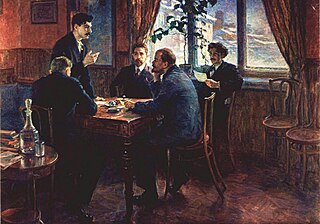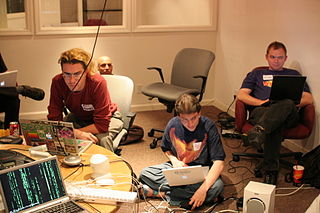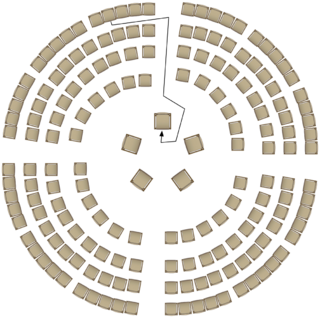A meeting is when two or more people come together to discuss one or more topics, often in a formal or business setting, but meetings also occur in a variety of other environments. Meetings can be used as form of group decision making.
Appreciative inquiry (AI) is a model that seeks to engage stakeholders in self-determined change. According to Gervase Bushe, professor of leadership and organization development at the Beedie School of Business and a researcher on the topic, "AI revolutionized the field of organization development and was a precursor to the rise of positive organization studies and the strengths based movement in American management." It was developed at Case Western Reserve University's department of organizational behavior, starting with a 1987 article by David Cooperrider and Suresh Srivastva. They felt that the overuse of problem solving hampered any kind of social improvement, and what was needed were new methods of inquiry that would help generate new ideas and models for how to organize.

A conference is a meeting, often lasting a few days, which is organized on a particular subject, or to bring together people who have a common interest. Conferences can be used as a form of group decision-making, although discussion, not always decisions, is the primary purpose of conferences. The term derives from the word confer.
Margaret (Meg) Wheatley is an American writer, teacher, speaker, and management consultant who works to create organizations and communities worthy of human habitation. She draws from many disciplines: organizational behavior, chaos theory, living systems science, ancient spiritual traditions, history, sociology, and anthropology.

Foo Camp is an annual hacker event hosted by publisher O'Reilly Media. O'Reilly describes it as "the wiki of conferences", where the program is developed by the attendees at the event, using big whiteboard schedule templates that can be rewritten or overwritten by attendees to optimize the schedule; this type of event is sometimes called an unconference.

BarCamp is an international network of user-generated conferences primarily focused on technology and the web. They are open, participatory workshop-events, the content of which is provided by participants. The first BarCamps focused on early stage web applications, and were related to open-source technologies, social software, and open data formats.

An unconference is a participant-driven meeting. The term "unconference" has been applied, or self-applied, to a wide range of gatherings that try to avoid hierarchical aspects of a conventional conference, such as sponsored presentations and top-down organization.
Linear management is the application of reductionism to management problems, often relying on the ability to predict, engineer and control outcomes by manipulating the component parts of a business. Business process reengineering (BPR) is a popular example of linear management at work. The key defining characteristic of linear management is that order is imposed – usually from above.

Science Foo Camp (scifoo) is an annual of interdisciplinary scientific unconferences organized by O'Reilly Media, Digital Science, Alphabet Inc., based on an idea from Linda Stone. The event is based on the spirit and format of Foo Camp, an event focused on emerging technology, and is designed to encourage collaboration between scientists who would not typically work together. As such, it is unusual among conferences in three ways:
- attendance is by invitation-only
- the delegates come from many different areas of science rather than one subject, such as physics, chemistry or biology
- the meeting has no fixed agenda; the invited scientists, technologists and policy makers set the conference program during the conference itself, based on their shared professional interests and enthusiasms, aka unconference
Brand engagement is the process of forming an emotional or rational attachment between a consumer and a brand. It comprises one aspect of brand management. Brand engagement will impact brand attachment and has a positive influence on customer purchase intentions. Brands can form these attachments through different strategies that will promote their brand and overall customer satisfaction.

A fishbowl conversation is a form of dialogue that can be used when discussing topics within large groups. Fishbowl conversations are sometimes also used in participatory events such as unconferences. The advantage of fishbowl is that it allows the entire group to participate in a conversation. Several people can join the discussion.

Kinnernet is a series of invitation-only unconference events formed by entrepreneurs, technologists, startup founders, scientists, media professionals, and creatives.
A network-centric organization is a network governance pattern which empowers knowledge workers to create and leverage information to increase competitive advantage through the collaboration of small and agile self-directed teams. It is emerging in many progressive 21st century enterprises. This implies new ways of working, with consequences for the enterprise’s infrastructure, processes, people and culture.
Peter Block is an American author, consultant, and speaker in the areas of organization development, community building, and civic engagement.

Sweden Social Web Camp (SSWC) was a Swedish user-generated conference held on the island of Tjärö, Karlshamn Municipality, active between 2009 and 2013. The event focussed on internet and web technology and use in the context of social media. The format was open, participatory workshop-events, the content of which is provided by the participants. As anyone could decide to run a workshop during the event other, non-social web, subjects have of course turned up on the unconference grid.
The Ada Initiative was a non-profit organization that sought to increase women's participation in the free culture movement, open source technology and open culture. The organization was founded in 2011 by Linux kernel developer and open source advocate Valerie Aurora and open source developer and advocate Mary Gardiner. It was named after Ada Lovelace, who is often celebrated as the world's first computer programmer, as is the Ada programming language. In August 2015, the Ada Initiative board announced that the organization would shut down in October 2015. According to the announcement, the Initiative's executive leadership decided to step down, and the organization was unable to find acceptable replacement leaders.

A world café is a structured conversational process for knowledge sharing in which groups of people discuss a topic at several small tables like those in a café. Some degree of formality may be retained to make sure that everyone gets a chance to speak. Although pre-defined questions have been agreed upon at the beginning, outcomes or solutions are not decided in advance. The assumption is that collective discussion can shift people's conceptions and encourage collective action. Events need to have at least twelve participants, but there is no upper limit. For example, in Israel in 2011 an event called 1000 Tables was hosted in several cities on a single day as part of a series of social justice protests held around that time, and around a thousand people participated.
An EdCamp is a participant-driven conference – commonly referred to as an "unconference". EdCamps are designed to provide participant-driven professional development for K-12 educators. EdCamps are modeled after BarCamps, free participant-driven conferences with a primary focus on technology and computers. Educational technology is a common topic area for EdCamps, as are pedagogy, practical examples in instructional use of modern tools, and solving the problems technology can introduce into the classroom environment.
BIL is an unconference organized and observed by the participants. It was founded in 2007 by Cody Marx Bailey, Todd Huffman, Bill Erickson and others who volunteered to help with the idea.
“The Art of Hosting” is a method of participatory leadership for facilitating group processes, as used by a loose-knit community of practitioners. In their method, people are invited into structured conversation about matters they are concerned about while facilitators act as hosts. This community group understands “hosting” as a certain way of facilitation that is supposed to have the capacity of making emerge the collective intelligence that people possess. As an approach to facilitation, The Art of Hosting is focused on “improved, conscious, and kind ways of growing a capacity to support a deliberate wisdom, unique to being together,” and also relies on a specific attitude to process organization. The practitioners see this methodology of engagement as a way to bring people in complex, social systems into convergence on collective actions, with the participants discovering and proposing their own solutions.









